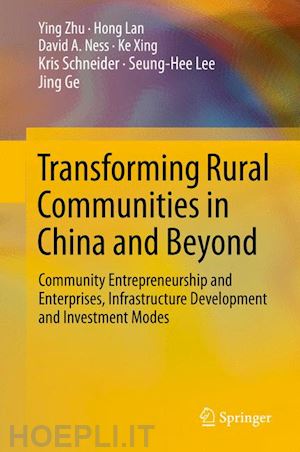

Questo prodotto usufruisce delle SPEDIZIONI GRATIS
selezionando l'opzione Corriere Veloce in fase di ordine.
Pagabile anche con Carta della cultura giovani e del merito, 18App Bonus Cultura e Carta del Docente
This book represents one of the first attempts by a multidisciplinary research team, encompassing the social sciences, business, architecture and planning, engineering, and finance and economics, to help rural communities discover sustainable and self-reliant paths to development and transformation.
The opening chapter outlines the background of the research, its importance in the context of China and other countries, the rationale for choosing the case study communities in rural China, and the composition of the research team. Chapter 2 explores key issues in the role of social entrepreneurship and leadership in rural community development. Chapter 3 analyses a green platform for a pilot transaction of China forest carbon sinks led by the Huadong Forestry Exchange. The fourth chapter examines carbon trade, forestry land rights, and the livelihoods of farmers in rural Chinese communities. Chapter 5 explores alternative energy development in rural Chinese communities, where the poor are often disproportionately dependent on fuel wood and solid biomass, causing environmental degradation, reduced productivity and the decline of income generating opportunities. Chapter 6 examines and tests the proposition that stronger communities will result from ‘connected up’, holistic, synergistic and inclusive planning of services and supporting infrastructure. Chapter 7 analyzes information and communications technology (ICT) based service innovations for supporting rural community enterprises. Chapter 8 highlights key elements of stronger rural communities, drawing together the themes and proposals of preceding chapters and constructing an integrated model.
The authors demonstrate that interconnected community enterprises based on clean forest products, forest carbon and ecotourism can be underpinned by local infrastructure enterprises such as renewable energy, water, waste management, ICT and transport, and financial mechanisms like carbon finance, allinvolving skills development, leadership and social entrepreneurship coupled with corporate and investment partnerships. Such interconnected approaches are expected to generate increased employment and prosperity, improve social livelihoods, and benefit the environment.
Chapter 1 Introduction.- Chapter 2 Rural community development and the role of social entrepreneurs.- Chapter 3 Market-based financing mechanism and design of voluntary trading platform for China forest sinks.- Chapter 4 Carbon trade, forestry land rights and farmers’ livelihood in rural community in China.- Chapter 5 Alternative energy development in China rural communities.- Chapter 6 Transforming rural communities by synergistic, integrated and inclusive planning of services and infrastructure.- Chapter 7 Key characteristics of rural ICT service innovation: a case analysis of ICT-enabled rural financial services in China.- Chapter 8 Towards An integrated model.











Il sito utilizza cookie ed altri strumenti di tracciamento che raccolgono informazioni dal dispositivo dell’utente. Oltre ai cookie tecnici ed analitici aggregati, strettamente necessari per il funzionamento di questo sito web, previo consenso dell’utente possono essere installati cookie di profilazione e marketing e cookie dei social media. Cliccando su “Accetto tutti i cookie” saranno attivate tutte le categorie di cookie. Per accettare solo deterninate categorie di cookie, cliccare invece su “Impostazioni cookie”. Chiudendo il banner o continuando a navigare saranno installati solo cookie tecnici. Per maggiori dettagli, consultare la Cookie Policy.